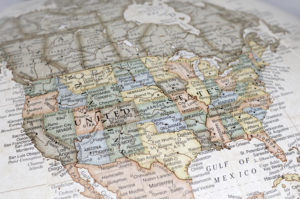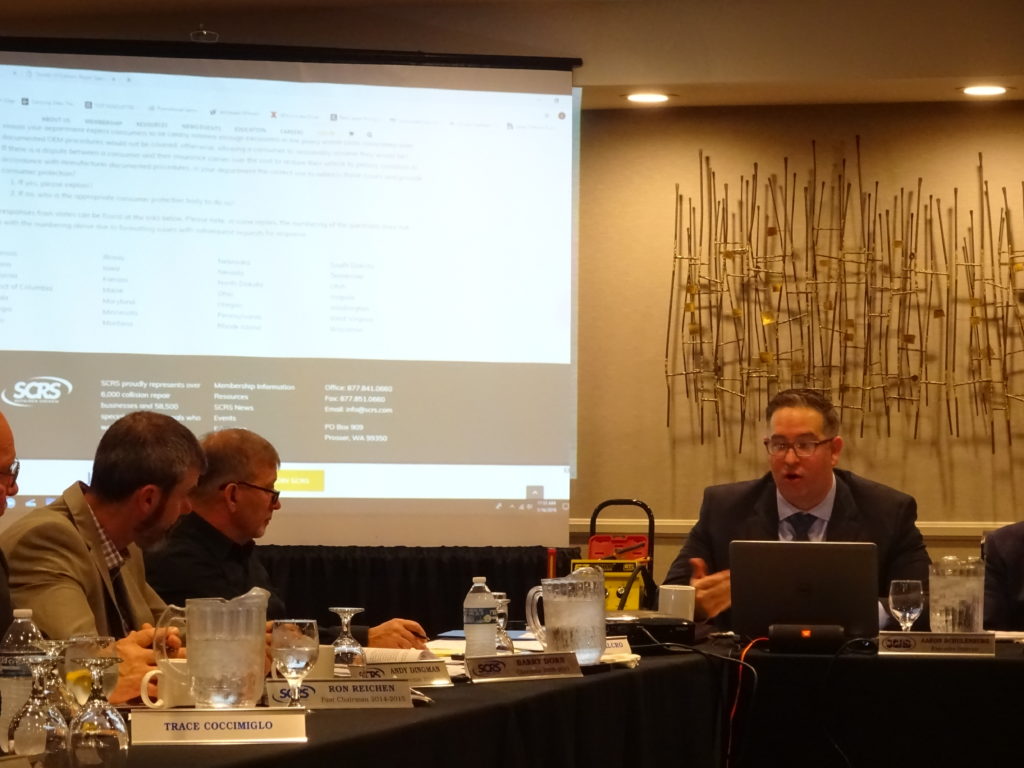
SCRS posts DOI responses to OEM procedure, consumer inquiries; 20+ states still no-shows
By onAnnouncements | Associations | Insurance | Legal | Market Trends | Repair Operations
The Society of Collision Repair Specialists has posted responses from insurance departments in more than half of the nation’s states and the District of Columbia regarding how the DOIs view OEM procedures and consumer claim handling complaints.
“It is the position of SCRS that if an OEM documents a repair procedure as required, recommended or other wise necessary as a result of damage or repair, that those published procedures would be the standard of repair until such time the documentation changes,” SCRS wrote on a new webpage dedicated to the project. “Our position, communicated to our members, is that disregarding a documented procedure that is made available to the industry creates undue and avoidable liability on the repair facility performing the repair.
“As part of our informational work on behalf of our members, we established a desire to determine the role that each state DOI office plays in helping consumers ensure the claims settlement process will also ensure them a complete and proper repair.”
The 29 responses (28 states and Washington, D.C.) posted to the organization’s website represent the first results for an effort that spanned all 50 states.
SCRS said it had asked:
- Is your department charged with consumer protection and the entity who serves as the regulatory agency to govern and supervise the business of insurance in your state?
- Are claims settlement practices a part of that regulatory oversight? …
- Is there anything that holds insurers and insurance policies sold in your state accountable to recognize manufacturer documented procedures as a basis for settling claims and loss indemnification?
- Would your department consider it a “reasonable” expectation that if an OEM repair procedure or instruction existed, that the claim should cover the associated costs?
- Would your department expect consumers to be clearly notified through exclusions in the policy where costs associated with documented OEM procedures would not be covered; otherwise, allowing a consumer to reasonably assume they would be?
- If there is a dispute between a consumer and their insurance carrier over the cost to restore their vehicle to preloss condition in accordance with manufacturer documented procedures, is your department the correct one to address those issues and provide consumer protection?
- If yes, please explain?
- If no, who is the appropriate consumer protection body to do so? (Minor formatting edits.)
SCRS Executive Director Aaron Schulenburg said at a January open board meeting it was “evident” in many of the responses that either a “lack of understanding” of the issue exists within the DOIs or “there truly are gaps in statute” which fail to describe OEM procedural operations within the claims settlement process.
Such responses should help inform the discussion in statehouses as repairers and OEMs pursue manufacturer procedure legislation.
However, as noted above, nearly half the country hadn’t even responded at all to SCRS. The holdouts to date include Alabama, Alaska, Colorado, Connecticut, Delaware, Hawaii, Indiana, Kentucky, Louisiana, Massachusetts, Michigan, Missouri, New Hampshire, New Jersey, New Mexico, New York, North Carolina, Oklahoma, South Carolina, Texas, Vermont and Wyoming.
Some states arguably flirted with holdout status for failing to specifically address some of SCRS’ questions. Instead, they referred the organization to state law SCRS could have looked up on its own while offering little guidance how the law applied to the question. Florida, Nebraska, Ohio, West Virginia stood out as particularly unhelpful here.
One hopes the agencies at least more helpful when the taxpayers covering their salary — folks less likely far less familiar with law and regulation — need a little clarification.
Arizona and Wisconsin’s responses were particularly questionable.
Arizona replied in a letter dated Oct. 17, 2018, that it couldn’t possibly answer any questions on a document that referenced the $31.5 million Seebachan v. John Eagle verdict (later settled for an undisclosed amount), for the Seebachans were suing State Farm in a related case.
According to Arizona DOI regulatory legal affairs officer Mary Koskinski, “the Department feels it would be inappropriate, as an insurance regulator, to respond to your question at this time.”
This answer is problematic for a couple of reasons. Should an insurer getting sued in a completely different state and jurisdiction (not only is it federal, the Eastern District of Texas isn’t even covered by Arizona’s federal appeals court) really shut down the Arizona DOI’s ability to answer general questions about how it thinks? Would SCRS have gotten an answer if it didn’t mention any case?
Worse, there’s the amusing detail that the Seebachans and State Farm announced a settlement Oct. 1, 2018 — more than two weeks prior to Koskinski’s letter. The court formally accepted it and dismissed the case with prejudice Oct. 3, 2018 — still two weeks prior.
Since the DOI was able to cite the specific Eastern District of Texas case number in the response, you’d think it’d maybe have double-checked that that case was still open.
Granted, Arizona did at least direct SCRS to a state law and rule to seek answers, even if it didn’t offer answers itself.
Wisconsin didn’t even provide that bit of guidance in its July 2018 response, though it did offer to meet with SCRS on the phone or at a National Association of Insurance Commissioner’s conference to answer questions. This hasn’t happened, nor would it necessarily address SCRS’ desire to get answers in writing.
Besides the offer to meet, Wisconsin Commissioner Theodore Nickel wrote that the state had a mission of “protecting the public while responding to its insurance needs.”
He then engaged in an questionable bit of self-congratulation:
The healthy and competitive nature of the insurance industry has helped to keep insurance rates in Wisconsin among the lowest in the country.
Recently, the State of Wisconsin received its second consecutive top ten ranking from the R Street institute’s Insurance Regulation Report Card’s annual examination of states doing the best job regulating the business of insurance.
The R Street Institute is a very free-market think tank. (You might remember it from our critique of a silly analysis it provided in 2016 regarding proposed California steering and labor rate survey regulations.) The report card, as far as we could tell, nothing to do with consumer protection as it regards to oversight of insurer claims handling.
“There are three fundamental questions this report seeks to answer,” R Street wrote of its 2018 report, which again saw Wisconsin in the Top 10. “How free are consumers to choose the insurance products they want? How free are insurers to provide the insurance products consumers want? How effectively are states discharging their duties to monitor insurer solvency and foster competitive, private insurance markets?”
So Wisconsin shops and consumers might not be as thrilled about that ranking as their insurance commissioner is.
The SCRS inquiry continues. See how your state did here.
Be heard: State department of insurance contact information can be found here.
Correction: Mississippi did indeed respond as it said, SCRS confirmed. The article has since been updated to reflect this. See its response here or on the SCRS website below.
More information:
SCRS department of insurance responses
Images:
The United States appears on a globe. (KeithBinns/iStock)
With the results of a study into state departments of insurance at left, Society of Collision Repair Specialists Executive Director Aaron Schulenburg speaks to an SCRS board meeting Jan. 16, 2019. (John Huetter/Repairer Driven News)

